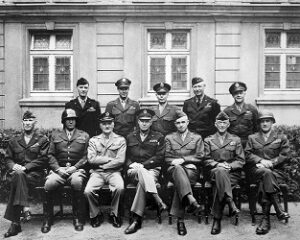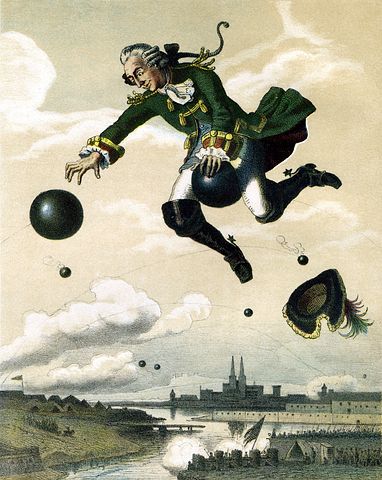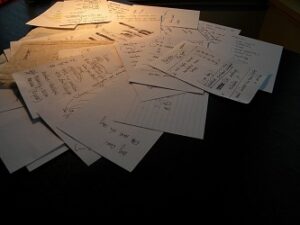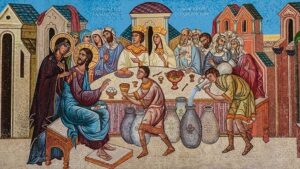 . . but planning is everything.
. . but planning is everything.
This saying is attributed to Dwight D. Eisenhower, and to be honest it didn’t make sense to me at first. Plans almost always go awry in some way, but that’s not the same as saying that plans are useless.
Substitute the word “preparation” for “planning” and the meaning becomes much clearer. I was reminded as I worked on this post of a talk I heard many years ago at an educational conference by Dr. Jerry Tetreau. He was speaking about the importance of being prepared to teach, using the Latin word praeparō, meaning “to make ready in advance.” If you’re prepared, then a change in plans won’t throw you. And there are always changes in plans, no matter how well thought out they may be.
Back in the mid-1970’s I saw a great illustration of this principle. A fellow graduate student was doing her speech recital, a dramatic presentation on Catherine Booth, the wife of William F. Booth, the founder of the Salvation Army. There she was, up on stage all by herself, costumed in a cape and hat, when suddenly something started flying around the stage. She kept going. Eventually, I think, the critter disappeared, but she never missed a beat, and she finished the recital to great applause. Know what it was? A bat. How would you ever plan for such a thing? The truth is, you wouldn’t. You couldn’t. You could only prepare.

 I wrote last week about John Piper’s book
I wrote last week about John Piper’s book  You know what got me started on this whole blogging thing? My son’s cancer experience. I knew there were lots of people who wanted to keep up with developments, and I found it very therapeutic to write it all down. So I went ahead and did it. This website had been up for months, but I hadn’t felt compelled to do much with it because I had no true focus, no true desire, just a vague idea that I needed to publicize my book. Suddenly, though, I had a real story to tell. Once I got started I realized how desirable it was to write these entries. And I kept going. To this very day.
You know what got me started on this whole blogging thing? My son’s cancer experience. I knew there were lots of people who wanted to keep up with developments, and I found it very therapeutic to write it all down. So I went ahead and did it. This website had been up for months, but I hadn’t felt compelled to do much with it because I had no true focus, no true desire, just a vague idea that I needed to publicize my book. Suddenly, though, I had a real story to tell. Once I got started I realized how desirable it was to write these entries. And I kept going. To this very day.
 I seem to be on a tool tear, as it were. Over the past several weeks I’ve written about using Scrivener as a writing tool, my little laptop as a bill-paying tool, and habits as tools to help lend structure to my life. But . . . I’ve also emphasized that tools don’t do the work for us. So I’m dedicating this post to two non-tool-users, Woody Allen and K. Lee Scott
I seem to be on a tool tear, as it were. Over the past several weeks I’ve written about using Scrivener as a writing tool, my little laptop as a bill-paying tool, and habits as tools to help lend structure to my life. But . . . I’ve also emphasized that tools don’t do the work for us. So I’m dedicating this post to two non-tool-users, Woody Allen and K. Lee Scott Another habits principle is that you’re more likely to do what’s convenient and less likely to do what isn’t. It struck me just a day or two ago that I had a tool that I loved, that was extremely convenient and which I could use more: my darling little laptop. You can see in the picture how small it is. [Note: this is a stock image; as with so many other pictures, this one was lost in the website move. And now, as I re-do this post, that little laptop is long gone–I think I’m o the third one now.] I carry it around with me from room to room just as some people carry around their smartphones. [Again, a further note: I certainly now have a smartphone!] A couple of days ago I sat down to pay some bills and realized that I hadn’t balanced the checkbook for some time. I’ve still been using a paper check register to do this, and I thought, Why don’t I use my laptop? I googled “virtual check register” and found something called “checkbook.com.” I also used the strategy of the “clean slate,” another Gretchen Rubin idea. I didn’t bother with going back and checking every transaction since the last time I did the balancing act; I don’t think I’ve ever found a mistake on the bank’s side, so what was the point? The important thing is for me to have some kind of backup information, although I guess it would be fine just to rely on the bank’s online statement. I may re-think the issue in the future, but at least for now I can just enter items online and see the balance computed for me. I’m also going to go ahead and start actually paying the bills online, something I’ve resisted doing for some reason. Why should I go through the inconvenient process of writing out checks, entering them in the register, putting the check and the payment slip in an envelope, hunting up a stamp and a return address label, and then mailing them? Hmmm. As soon as I get finished writing this post I’ll go to the bank website, pay off yesterday’s credit card charges and pay the two bills I have right now. One is a medical bill that will have to be paid by check, but the other is the monthly phone/internet charge, so I can set up online bill pay for that. (I realize that the preceding may sound like I’m still using a quill pen and paying bills with bags of coins, but I’m really trying to become more hip and happening!) I’ve been wanting to establish the habit of keeping up with our finances on a daily or semi-daily basis; the use of a convenient, familiar, well-liked tool will help me do that.
Another habits principle is that you’re more likely to do what’s convenient and less likely to do what isn’t. It struck me just a day or two ago that I had a tool that I loved, that was extremely convenient and which I could use more: my darling little laptop. You can see in the picture how small it is. [Note: this is a stock image; as with so many other pictures, this one was lost in the website move. And now, as I re-do this post, that little laptop is long gone–I think I’m o the third one now.] I carry it around with me from room to room just as some people carry around their smartphones. [Again, a further note: I certainly now have a smartphone!] A couple of days ago I sat down to pay some bills and realized that I hadn’t balanced the checkbook for some time. I’ve still been using a paper check register to do this, and I thought, Why don’t I use my laptop? I googled “virtual check register” and found something called “checkbook.com.” I also used the strategy of the “clean slate,” another Gretchen Rubin idea. I didn’t bother with going back and checking every transaction since the last time I did the balancing act; I don’t think I’ve ever found a mistake on the bank’s side, so what was the point? The important thing is for me to have some kind of backup information, although I guess it would be fine just to rely on the bank’s online statement. I may re-think the issue in the future, but at least for now I can just enter items online and see the balance computed for me. I’m also going to go ahead and start actually paying the bills online, something I’ve resisted doing for some reason. Why should I go through the inconvenient process of writing out checks, entering them in the register, putting the check and the payment slip in an envelope, hunting up a stamp and a return address label, and then mailing them? Hmmm. As soon as I get finished writing this post I’ll go to the bank website, pay off yesterday’s credit card charges and pay the two bills I have right now. One is a medical bill that will have to be paid by check, but the other is the monthly phone/internet charge, so I can set up online bill pay for that. (I realize that the preceding may sound like I’m still using a quill pen and paying bills with bags of coins, but I’m really trying to become more hip and happening!) I’ve been wanting to establish the habit of keeping up with our finances on a daily or semi-daily basis; the use of a convenient, familiar, well-liked tool will help me do that. I wrote last week about my struggles to keep promises I make to myself and reach goals I set for myself, as I am a classic Obliger. Those of us who fit into this category need some kind of outside push to get going, and this push is usually described as accountability. But, as I said last week in “The Accountability Conundrum,” it’s sometimes very hard to set up that kind of structure.
I wrote last week about my struggles to keep promises I make to myself and reach goals I set for myself, as I am a classic Obliger. Those of us who fit into this category need some kind of outside push to get going, and this push is usually described as accountability. But, as I said last week in “The Accountability Conundrum,” it’s sometimes very hard to set up that kind of structure. As everyone in the known universe knows, Gretchen Rubin’s new book on habits, Better than Before, came out last week. While Gideon was getting his MRI on Friday at the hospital I walked over to the Tattered Cover Bookstore to buy my copy and get my admission ticket for her appearance there tomorrow night. I’ve been reading it kind of slowly, trying to savor it and take it all in. I even plan to do something very rare for me: go back and highlight the most important ideas.
As everyone in the known universe knows, Gretchen Rubin’s new book on habits, Better than Before, came out last week. While Gideon was getting his MRI on Friday at the hospital I walked over to the Tattered Cover Bookstore to buy my copy and get my admission ticket for her appearance there tomorrow night. I’ve been reading it kind of slowly, trying to savor it and take it all in. I even plan to do something very rare for me: go back and highlight the most important ideas. . . but planning is everything.
. . but planning is everything. . . . everyone will have a good time!
. . . everyone will have a good time!